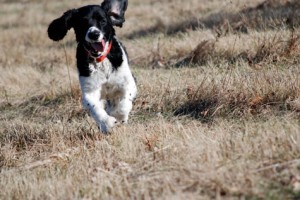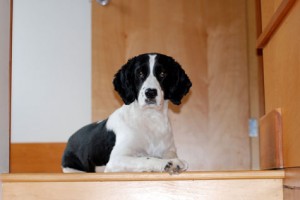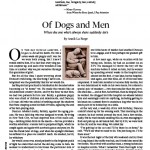Published in Bark magazine, August 2011
“Listen,
the heart-shackles are not, as you think,
death, illness, pain,
unrequited hope, not loneliness, but
lassitude, rue, vainglory, fear, anxiety,
selfishness.”
—Mary Oliver, from When the Roses Speak, I Pay Attention
Since the day Duncan arrived, I began to dread his death. He was a seven-week-old puppy and I was 36; we were both young, but I knew I would outlive him. It’s a fact that every dog person conjures with, and each of us wonders at one time or another why we put ourselves through this guarantee of grief.
But for all the time I spent worrying about Duncan’s well-being, the one thing I never contemplated was the possibility that his vet would die.
Jay Shapiro had practiced in Manhattan for decades before becoming an “at home” vet. He made the rounds like an old-fashioned country doctor, and by the time we met him, we had two patients for his care: Bucky, a guileless puppy who was afraid of children and skateboards, and Duncan, a 10-year-old who was afraid of nothing except the shadows that were creeping across his field of vision, signaling the end of his ball-playing days.
Duncan rebelled madly, futilely, against the aging process. He was a field dog who was designed to work; by living in New York City, we had deprived him of his main calling—fetching fallen birds in the marsh—but we provided a worthy substitute: a tennis ball in perpetual flight, which he caught again and again with acrobatic grace and pure joy. He was the Derek Jeter of dogs, and when his eyesight dimmed, he suffered in a place we couldn’t reach. He snarled, he bit, he withdrew.
Jay would come over, stand patiently in the brightest patch of light he could find and let the old dog come to him. He seemed to understand in his bones the particular mix of physical and emotional pain Duncan was experiencing. He referred us to an animal behaviorist and eventually, with medication and special care, Duncan passed through the bad patch. He was creaky, yes, but he was present. We and our little team of medics had enabled Duncan to re-engage, and it was perhaps our greatest gift to him.
A few years ago, while on vacation with his young son, Jordan, Jay had an accident on an ATV. He managed to throw the boy off the machine before it rolled on him, but he wound up spending several weeks in the hospital and almost lost his foot. A year later, he was hospitalized again, and this time, all ten of his toes were amputated. It took him months to become fully mobile, but he was determined to walk on his own steam. He ordered a special pair of sneakers—two sizes smaller than his previous shoe size—and at first, he hobbled, then he limped, then he walked. He dragged his little hospital-on-wheels behind him and seemingly could do anything, including get to his knees on a cement floor to examine a dog who was in too much pain to be hoisted up on a table.
At the very end, a week shy of his 16th birthday, Duncan couldn’t stand up for his evening walk. That morning in the country he had trotted around the yard. Just a few strides, really, but he was himself, smelling the air, even managing to find and pick up an old tennis ball. But by 8:30, we were back in the city and he was ailing. We called Jay.
“I’m getting in the car and I’ll be there in an hour,” he said. “We’ll see what we need to do. You just hang on, I’ll be there soon.”
It was the last night of the July 4th weekend and Jay lived on Long Island; the traffic was bad, and it took him more like two hours. He arrived with another man, a young technician in hospital scrubs. What I remember from that night is Jay talking to us, helping us make the decision. Making it clear that it was a decision. He would get in his car and return to Long Island, he said, then come back in a few days and see how Duncan was doing. We could wait.
But it was clear it was time, and the peace of Duncan’s passing was punctuated only by the fireworks that simultaneously erupted along the Hudson River. I asked the tech to carry him downstairs in a blanket because I didn’t want to upset anyone in the elevator. This fellow—alas, I never learned his name—had probably been settled in front of the television with a baseball game and a beer when Jay called and asked him to drive to Manhattan in holiday beach traffic to help out an old dog. Obviously, he didn’t think twice; Jay was going to work and so would he. All the way down five long flights with a heavy load in his arms, this young man spoke about how Jay inspired him—of his dedication, his kindness, his intelligence.
The next morning, Jay called; he had done a late-night necropsy and found pervasive cancer. “I just wanted you to know for sure that you made the right decision,” he said. “You saved him suffering.”
Six weeks later, Jay was back to remove a strange growth from Bucky’s paw. I wrestled the dog onto a table and held on for dear life as Jay anaesthetized the spot and cut it away. I was terrified. Also, it was August in Manhattan; it was over 100 degrees and I was embracing 60 pounds of writhing fur. Jay had brought Jordan, now eight, who was playing a video game on the couch; they were leaving for a week’s vacation the next day. “You’re doing great,” he smiled. “Are you okay?” There he was, more than six feet tall and teetering on too-small feet, doing the most precise surgical maneuver I’ve ever seen on a jittery animal in mediocre light on a kitchen table, and he was checking on me.
Then in the background: “Dad, can I download an app on your iPhone?”
Four days later, Jay was dead. His last email to me, written the day before he died, assured us that Bucky’s growth, while a tumor, was benign, and his surgery was curative. “The leaves are starting to change color in New Hampshire,” he wrote. “Hope all is well, will check in next week.”
We didn’t know about his death until several weeks later. His phone had been disconnected and he wasn’t replying to emails, so I finally called his sister. On the phone, she told me many things about Jay, including that when he was hospitalized the previous year, he had spent a week in a coma. She, his best friend, sat beside him, holding his hand. Finally, he emerged and, at age 62, taught himself how to walk, and work, again.
We hadn’t known. He was so stoic, so tough. Like Duncan, he just soldiered on, got to the other side of whatever pain he was feeling, whatever obstacle his body threw at him. And no matter what, he was always there. We never had to worry, never had to dread. All we had to do was pick up the phone and call. “You just hang on, I’ll be there soon.”
He was loyal, constant and true. It hit me like a gale force, the realization that I had taken so much for granted about this man and the role he played in our lives. By the time I understood, he was gone, and it was too late to say goodbye.
Note: this article originally appeared in The Bark magazine, in the June – August 2011 issue. Download the PDF here.





Annik, Thank you for a wonderful and poetic tribute. Dr. Shapiro was the first vet for our 2 cats, while he was still located at the West 86th Street office. After he sold the practice, we had him over for a couple of house calls. The last time we saw him was in 2009 and yet it’s inconceivable that it was so long ago — we still listed him as one of our emergency contacts whenever we traveled. Everything you’ve written rings true; he was such a wonderful vet. And it’s only today, a year-and-a-half after he died, that I found out, first by calling his number, then by e-mailing him, and finally by doing a web search. It was devastating to read your article, but I thank you greatly for it … otherwise I really wonder whether I would ever have learned the sad news. We saw him only occasionally, but he was a special part of our lives, and it is heartbreaking to hear that he is gone.
Daniel, thanks for your lovely comment. I think about Jay all the time, and still can’t believe he’s gone. He was an extraordinary man and a great friend, both to us and our dogs, and I know that most of his patients felt the same way. He is irreplaceable.
Here I am 64 years old with my two beloved Samoyeds in beautiful North Carolina teared up while reading your story.I also love my dogs and fear their inevitable death.They are my closest friends.What hit me hard was your loss of a special person in your life.Ive lost many close friends and every day I would trade anything just to speak to them one last time. steve